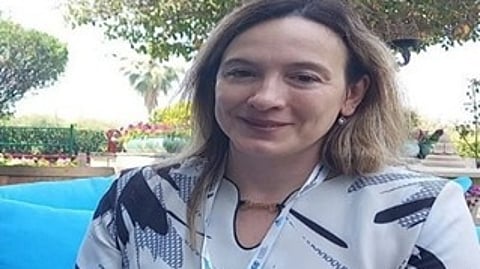

In a conversation with The New Indian Express' Amisha Mohan, the head of the BRICS Expert Council for Russia and W20 Sherpa Victoria Panova discussed the role of BRICS in maintaining unity among its diverse members amid geopolitical tensions, the challenges in achieving gender equality across G20 nations, and more. Excerpts:
India successfully chaired the G20 summit in 2023. How do you think that defined India's readiness to take on a leadership role and shape the future of international cooperation?
India's successful chairmanship of the 2023 G20 Summit highlighted that it’s ready to assume a more prominent role in shaping global challenges such as climate change, global health and digital transformation. It has an important role in the global order. The summit's theme, 'One Earth, One Family, One Future', also highlighted India's vision of inclusive global growth. India has both the expertise and interest to promote international cooperation in areas such as renewable energy, digital governance and trade reforms.
Geopolitical tensions are on the rise and shifting alliances are the new norm. How do you see BRICS maintaining unity among its diverse members while advocating for a multipolar world order?
Though there are diverse political systems, BRICS maintains unity through its shared commitment to sovereignty, mutual respect and a multipolar world order. In the face of global tensions and shifting alliances, BRICS emphasizes dialogue and consensus. Diverse voices within the bloc have always acted as a catalyst in fostering inclusive solutions. This is an era of multilateralism and new dynamics and BRICS is a cooperative platform.
As a W20 Sherpa, what do you think are the biggest challenges in achieving gender equality across G20 nations?
The biggest hurdles in achieving gender equality in G20 nations are persistent gender stereotypes, unequal economic opportunities, underrepresentation of women in leadership roles and the burden of unpaid care work. There is lack of transparency in the implementation of policies that protect women’s labour rights. Addressing these issues requires coordinated efforts across governments, inclusive policy-making and a shift in societal mindsets.
If we look at Russia, during the times of the Soviet Union, we introduced bills for legal equality, so by law, it is provided that men and women are equal, by opportunities, by possibilities. But of course, different countries have different starting points. That’s why in 2015, Women-20 was launched by the Turkish Presidency and was supported by the Russian Federation’s Sherpa Svetlana Lukash.
Similarly, a multifaceted approach by different countries has been instrumental in initiating action on women’s issues. Groups within the G20, such as W20 and G20 Empower, often propose policy recommendations on women’s issues like leadership, equal pay, etc. Moreover, the G20 is implementing tools like the G20 Empower KPI Dashboard to track progress on gender equality metrics and gain insights into measurable outcomes. So, we hope we are coming closer to create an inclusive environment.
What mechanisms can be introduced to enhance women’s participation in peacebuilding and diplomacy?
Women are significantly underrepresented in peacebuilding and diplomacy roles globally. If we look at peacebuilding, there are just 16% of women in this area. The reasons, like I mentioned, are gender stereotypes, security risks, lack of decision-making spaces and unequal opportunities. There is a need to create safe and supportive environment which would ensure meaningful participation of women. At the same time, bridging the gaps between grassroots and formal diplomatic structures would shift the narrative from merely empowering women to enabling them to lead development initiatives.
How do you think BRICS can address the needs of the Global South?
BRICS has emerged as a powerful voice of the Global South. Unlike traditional institutions that often impose conditionalities, BRICS operates on the principles of mutual respect, non-interference and equal partnership and BRICS countries do not showcase their superiority. It is an all-encompassing space, with countries understanding their own needs.
BRICS serves as a platform to amplify the concerns of the Global South on the world stage, pushing for reforms in institutions like the UN, IMF and World Bank to reflect current global realities. Acting as a platform for partnership, it can uplift the Global South by offering fair financing, sharing technology and knowledge to aid alternative financing without the conditionalities typical of Western-led institutions, and facilitate capacity building by acting as a catalyst for nations to pursue their development priorities.
How can BRICS enhance its cooperation on climate change and sustainability, especially considering the urgency of addressing environmental challenges?
I think BRICS holds significant potential to enhance cooperation on climate change and sustainability. Co-developing clean technologies, joint research and development can help in mitigating climate challenges to a large extent. Moreover, data and knowledge sharing through exchange of best practices in urban sustainability, green goods, biofuels and water conservation can be an added advantage.